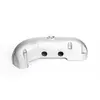Mobile:+86-311-808-126-83
Email:info@ydcastings.com
double casing pump
Understanding Double Casing Pumps An Overview
Double casing pumps, also known as double-walled pumps, are specialized types of pumps designed to enhance the safety and efficiency of fluid transfer operations. These pumps are equipped with two concentric casings that provide several advantages over their single-casing counterparts. In this article, we will explore the structure, working principles, advantages, applications, and maintenance considerations of double casing pumps.
Structure and Functionality
The fundamental design of a double casing pump includes an inner casing and an outer casing, creating an annular space between them. The inner casing is responsible for containing the fluid being pumped, while the outer casing serves as a protective barrier. This unique design not only enhances structural integrity but also minimizes the risk of leaks.
The pump operates through the same principles as centrifugal pumps, where rotational energy is converted into hydraulic energy. As the impeller rotates, it imparts kinetic energy to the fluid, which is then converted to pressure energy as the fluid exits through the pump outlet. The double casing structure ensures that any potential failures or leaks from the inner casing are contained within the outer casing, preventing environmental contamination and ensuring safety.
Advantages of Double Casing Pumps
1. Leak Prevention The primary advantage of a double casing pump is its ability to prevent leaks. In industries where hazardous or corrosive fluids are handled, the risk of leakage can have serious environmental and safety repercussions. The outer casing acts as a secondary containment system, ensuring that any fluid escaping from the inner casing does not come into contact with the surroundings.
2. Enhanced Safety Double casing pumps enhance workplace safety by reducing the risk of spills and leaks. This is especially important in industries such as oil and gas, chemical manufacturing, and wastewater treatment, where exposure to harmful substances can pose significant health risks to workers.
3. Durability and Longevity The double-walled design improves the structural integrity of the pump, making it more durable and resistant to wear and tear from corrosive substances. This results in a longer operational life and reduced maintenance costs.
4. Energy Efficiency These pumps often operate more efficiently than single casing pumps due to their design. The containment provided by the outer casing can lead to better thermal insulation, which can be advantageous for processes requiring controlled temperature conditions.
Applications
Double casing pumps are utilized in various industries, including
double casing pump

- Petroleum Industry In the oil and gas sector, double casing pumps are crucial for transferring crude oil, refined products, and other chemicals safely
.- Chemical Processing The chemical industry frequently uses these pumps to handle aggressive chemicals that would otherwise pose a risk if leaked.
- Wastewater Treatment In wastewater management, double casing pumps are employed to handle contaminated fluids, ensuring that any leaks are contained, thus protecting the environment.
- Food and Beverage In the food industry, these pumps are used to transfer non-toxic food products safely, demonstrating the versatility of double casing pumps.
Maintenance Considerations
While double casing pumps are designed for durability, regular maintenance is essential to ensure their optimal performance. Common maintenance practices include
- Regular Inspection Routine checks for signs of wear and tear, corrosion, and any potential leaks in both the inner and outer casings are crucial.
- Lubrication Ensuring the bearings and moving parts are adequately lubricated can greatly extend the pump’s lifespan and maintain efficiency.
- System Testing Periodic testing of the containment capabilities of the outer casing can help identify any potential issues before they become significant problems.
- Operator Training Proper training of personnel operating and maintaining the pumps ensures that they are aware of the best practices for handling equipment safely and effectively.
Conclusion
Double casing pumps are an essential component in various industries, providing safety, efficiency, and reliability in fluid transfer operations. Understanding their design, advantages, applications, and maintenance needs is crucial for maximizing performance and minimizing risks in industrial settings. As industries continue to prioritize safety and environmental protection, the role of double casing pumps will likely expand, playing a vital part in sustainable operational practices.
-
Why Should You Invest in Superior Pump Castings for Your Equipment?NewsJun.09,2025
-
Unlock Performance Potential with Stainless Impellers and Aluminum End CapsNewsJun.09,2025
-
Revolutionize Your Machinery with Superior Cast Iron and Aluminum ComponentsNewsJun.09,2025
-
Revolutionize Fluid Dynamics with Premium Pump ComponentsNewsJun.09,2025
-
Optimizing Industrial Systems with Essential Valve ComponentsNewsJun.09,2025
-
Elevate Grid Efficiency with High-Precision Power CastingsNewsJun.09,2025











